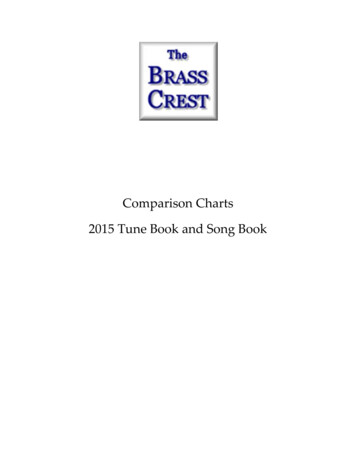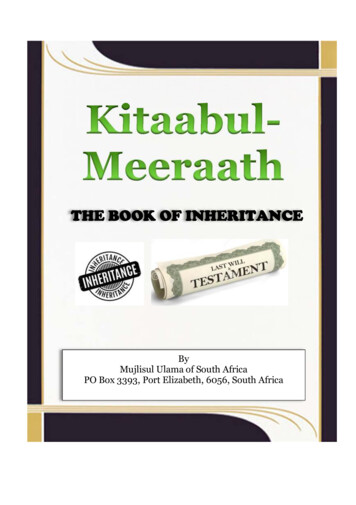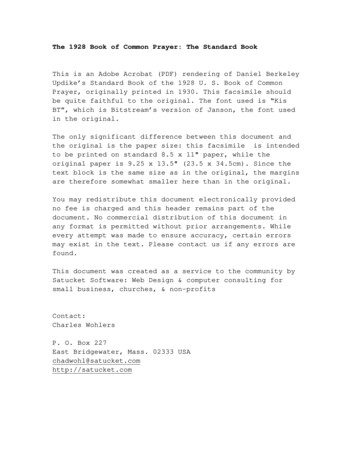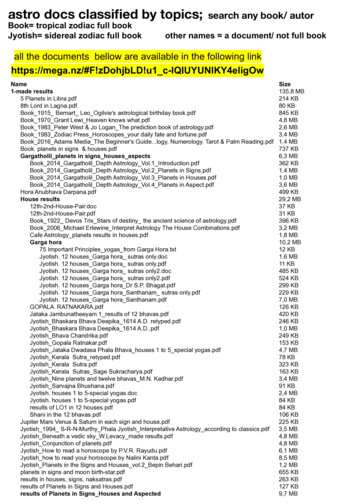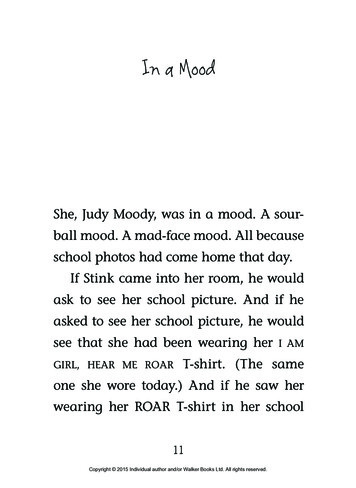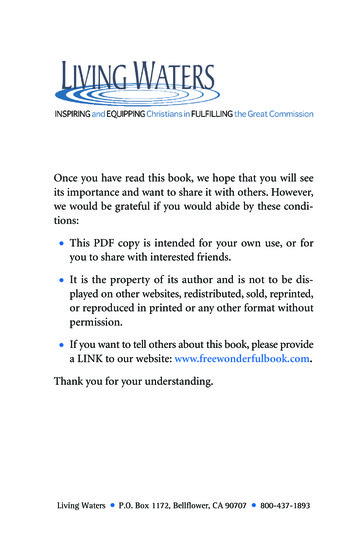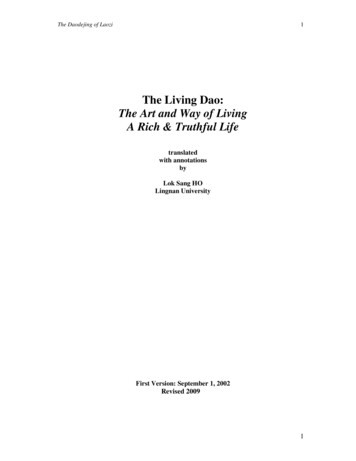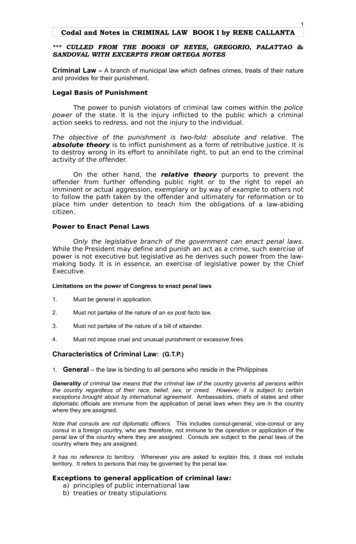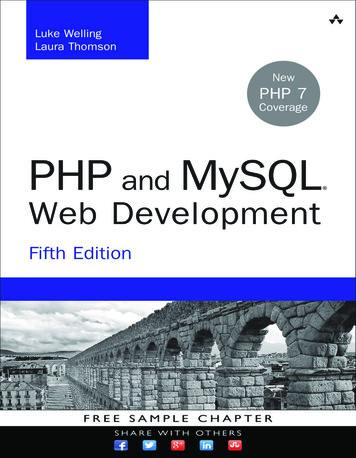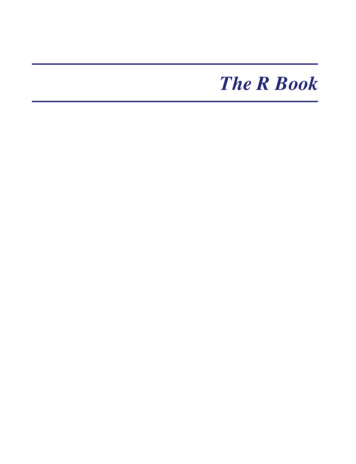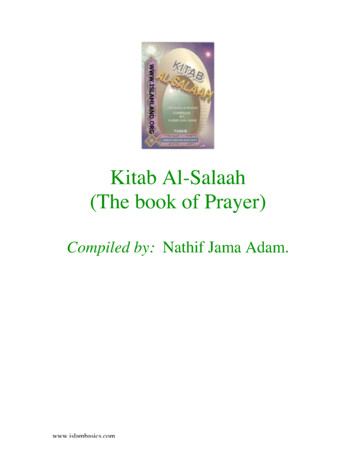
Transcription
Kitab Al-Salaah(The book of Prayer)Compiled by: Nathif Jama Adam.www.islambasics.com
PrefaceIntroductionThe Virtues Of PrayerWudhu (Ablution)Conditions for the Performance of WudhuEssential Acts of WudhuVoluntary Acts of WudhuHow the Wudhu is performedImportant Points on WudhuWiping Over the SocksHow Wiping Over the Socks is DoneWhen the Wiping Privilege CeasesMatters which Invalidate the WudhuGhusl (Total Bath)Occasions when Ghusl is Required as an obligatory ActOccasions for which Ghusl is preferredEssential Requirements of GhuslHow Ghusl is PerformedActs Forbidden to Persons who are required to Perform GhuslHaidh (Menstruation)Post-Childbirth Bleeding (Nifas)Acts Forbidden to Women Experiencing Menstruation and Post-Childbirth BleedingAt-Tayammum (Ablution Using The Earth)Instances when At-Tayammum is PermittedThe Earth (Soil) to be used for At-TayammaumHow to Perform At-TayammumMatters which Nullify At-TayammumThe Timings Of The Obligatory Prayers Adhaan (Call To Prayer)The Virtues of AdhaanHow the Adhaan is performedWhat Someone Supplicates Upon Hearing the AdhaanThe Supplication after the AdhaanIQAMAH Second Call to PrayerPerformance Of The SalaatConditions for the Prayer (Shuruud-Salaat)Categories of the Acts of the SalaatPillars of the Salaat (Arkanu-S alaat)Necessary Duties (Wajibatu-Salaat)Preferred Acts of the Salaat (Sunna- nu-Salaat)How The Salaat Is PerformedPerformance of Fajr the PrayerPerformance of the Dhuhr PrayerPerformance of the Asr PrayerPerformance of the Maghrib PrayerPerformance of the Isha PrayerForgetfulness Prostrations (Sujuud Sahw)www.islambasics.com
Various Instances Where "Sujuud Sahw" Becomes ApparentPrivate Supplications Recited Upon completing PrayersThings Which Invalidate The Prayer (Mubdilatu-Salaat)Things Which Are Not Preferred In The PrayerOther Important Notes Regarding Prayer Congregational PrayerPurpose of the Congregational PrayerThe Prayer Of A Travelling Person (Musafir)Characteristics of combining the prayersPerformance Of The Prayer By One Who Is Sick Voluntary PrayersTimes When Performance of Voluntary Prayers is ProhibitedJuma'h Prayer (Friday Con- Gregational Prayer)The Performance of the Juma'h PrayerThe Prayers Of The Two FeastsIdul-Fitr PrayerIdul-Adha PrayerSalatul-Istisqua (Rain Seeking Prayer)Eclipse Prayer (Salatul-Kusoof)The Witr (Odd Number) PrayerTarawih PrayerSalatul-Isstikhara (Prayer To Seek Allah's Guidance) Salatul-Janaza (Funeral Prayer)How the Funeral Prayer is PerformedA Summary Of The Different Types Of Prayerswww.islambasics.com
Preface!!!!!!!!!!! PRAISE be to Allah (subhanahu wa ta'ala1) who ordained As-alaat (Prayer) as anact of worship on His servants, and may the utmost peace and blessings of Allah(subhanahu wa ta'ala) be upon His prophet who taught the Ummah (Muslim nation) howbest to perform the prayer.!!!!!!!!!!! I do not intend to write along preface, but I merely wish to make a briefexplanation of my reasons for undertaking this work. It is natural that by virtue of itsimportance, many books have been written in the past about Salaat by different Muslimsin different parts of the world - may Allah (subhanahu wa ta'ala) reward them all for theirefforts. And, while a large number of the works so far carried out on Salaat havegenerally been well appreciated, it is however no secret also that many books on thissubject suffer serious shortcomings which notably may be summarized as follows:1.Apparent lack of subject comprehensiveness in most books. While, certainly, no singlewriter can comprehend a subject as wide as Salaat, but it is true that many books on thissubject only make scanty touch on it.2.The unfortunate existence in many of the books of various matters such as recitations,supplications and even acts purported to be part of the prayer but which cannot becorrectly traced to having been recited and/or performed by the Prophet (PBUH) or evenby his rightly guided Caliphs (successors).3.The absence of arrangement and order in most books with regard to the various mattersrelating to the prayer.4.The virtual absence in most books of TRANSLITERATION to the varioussupplications which a person needs to recite in the course of the prayer. Needless to say,but, the importance of transliteration to the non-Arabic speaking Muslims cannot be overemphasized.!!!!!!!!!!! In view of the foregoing that the thought of compiling a more appropriate treatiseon Salaat arose to me. And it is by the grace of Allah (subhanahu wa ta'ala) that it is nowin our hands although I am quite conscious of how unequal I am to a subject such as thisone to which a man of much greater capabilities than myself was required. I am,however, sustained by the conviction that the readers will overlook my shortcomings andtreat them with indulgence.!!!!!!!!!!! In compiling this treatise, I have endeavored to touch over almost all theimportant aspects of the prayer and there is perhaps no other book which provides suchan elaborate account of the subject although, as mentioned earlier. Salaat is just such awide subject that even this treatise is still in want of much other information on the samebut which, lnsha - Allah, shall be taken into account in the next reproduction.1Subhanahu wa ta'ala inserted after the name of Allah which means " The Glorified, the Most High ".www.islambasics.com
!!!!!!!!!!! How far I have succeeded in this work is not for me to say but it is my sincerehope that it will, InshaAllah, go a long way in fulfilling the gaps and shortcomings foundin other books written so far on the subject. The book, however cannot and, is not meantto be a substitute to the other works on the Salaat but rather complementary. Meanwhile,man is to err and this work may not necessarily be free from errors whether technical,typographical or otherwise. Hence, I make a kind appeal to all those who may discoversomething incorrect in this work to communicate the same to the publishers for duecorrection in the next re-print.!!!!!!!!!!! Compiling such work, did not only require my reference to a wide range of booksincluding the Holy Qur'an, Hadith books and Fiqh (Jurisprudence) books but also to seekthe help of other learned Muslim brethren. And in this regard, my appreciation goes toSheikh Hamoud M. Al-Lahim and Brother Abdalla Karshe both of Riyadh - may theAlmighty Allah bless them for their continuous counseling and advice. Similarly, thiswork would not have been completed had it not been for the tireless efforts of brotherMuhammed Ameen Cave of the Cooperative office for Call and Guidance, Riyadh, whonot only did the system data entering but even helped so much in the final proof-reading may Allah reward him for his share of contribution in this work.NATHIF J. ADAM.Riyadh, 21st May, 1991.www.islambasics.com
Introduction!!!!!!!!!!! Salaat (Prayer) is one of the main obligations which Allah (subhanahu wa ta'ala)has ordained on His servants. It is the first act of worship decreed on the Muslim Nation(Ummah) by Allah (subhanahu wa ta'ala) and was ordained on the night of the Prophet's(peace be upon him) ascension to the seven heavens. It is the second of the five pillars ofIslam after the proclamation of the "Shahada" (the words of witness).!!!!!!!!!!! It is enjoined on the Muslims as an obligatory act by Allah (subhanahu wa ta'ala)as can be noted from the following verses of the Holy Qur'an:“ Establish regular prayersat the sun's decline till the darkness of the night, and the morning prayer” (Qur'an17:78). In another verse Allah (subhanahu wa ta'ala) says:“ And establish regularprayers at the two ends of the day and at the approaches of the night” (Qur'an 11:1 14).!!!!!!!!!!! The importance of the Salaat has also been explicitly expressed by Allah'sMessenger (peace be upon him), as can be noted from the following sayings:“ What liesbetween a perfect man and disbelief is the leaving of prayer” (Related by Imams Ahmedand Muslim).!!!!!!!!!!! The Prophet (peace be upon him) also said:“ The obligation which separates usfrom them (the non-believers) is the prayer and he who renounces it becomes adisbeliever” (Related by Imams Ahmed and Muslim).!!!!!!!!!!! The above quoted Qur'anic commands by Allah (subhanahu wa ta'ala) and thehonored sayings of the Prophet (peace be upon him) clearly indicate the importance ofSalaat such that it is unanimously agreed by all Muslim scholars that renouncing it isregarded an act of disbelief (Kufr).www.islambasics.com
The Virtues Of Prayer!!!!!!!!!!! Salaat (Prayer) performed genuinely with humility and submission to Allah(subhanahu wa ta'ala) has unlimited virtues and benefits. It is the noblest expression offaith and the surest way of thanking Allah (subhanahu wa ta'ala) for His unlimited favors.It is the way to obtaining Allah's mercy, generosity, kindness, blessings and a sure way toparadise. Allah (subhanahu wa ta'ala) says in the Holy Qur'an:“ Prosperous indeed arethe believers who are humble in their prayers” (Qur'an 23:1-2).!!!!!!!!!!! It is a deliverance on the Day of Judgement for those who used to observe it well.The Prophet (peace be upon him) says:“ The first thing that the servant of Allah(subhanahu wa ta'ala) will be called to account for on the Day of Judgement will bethe prayer; and if it was good the person's deeds will have been good, but if it was bad,the person's deeds will have been bad” (Reported by Imam Bukhari).!!!!!!!!!!! Prayer purifies the soul, refines the character and inculcates in man the excellentvirtues of truthfulness, honesty and modesty. It keeps one who performs it fromfalsehood and from all forbidden actions as is categorically confirmed by the followingverse of the Holy Qur'an:“ Verily, prayer refrains from indecency and evil” (Qur'an29:45).www.islambasics.com
Wudhu (Ablution)!!!!!!!!!!! Prior to entering Salaat, the person is required to undertake a certain purificationprocedure known as "Wudhu" without which, the person's prayer would not beacceptable in the sight of Allah (subhanahu wa ta'ala). Allah,-the Almighty, says:“ O yewho believe, when ye prepare for prayer, wash your faces and your arms to the elbows,rub your heads (with water),- and (wash) your feet to the ankles” (Qur'an 5:6).!!!!!!!!!!! And the Prophet (peace be upon him), said:“ Prayer without ablution is invalid”(Reported by Imam Muslim).Conditions for the Performance of Wudhu!!!!!!!!!!! There are various conditions required to be fulfilled in the performance of Wudhuwhich are as follows:1.Acceptance of the Islamic Faith.2.Sanity and consciousness.3.Intention (Anniyah) to perform Wudhu as an act of worship.4.5.6.7.Purifying oneself from urine, excrement and all other kind of impurities beforeperforming Wudhu.Ensuring the purity of the water to be used for the Wudhu.Ensuring that water is not prevented from reaching the parts of the body which need tobe washed in the performance of the Wudhu.Being conscious and keeping the Wudhu in mind.Essential Acts of Wudhu1.Washing the entire face once with Rinsing the mouth with water and Sniffing of waterin and out of the nostrils.2.Washing each arm once.3.Wiping the entire head once and passing of water outside and inside of the earlobes.4.Washing the feet up to the ankles.5.Ensuring that the above 4 acts are performed in the given sequence.6.Performing the Wudhu acts continuously and without unnecessary let-ups untilcompletion.www.islambasics.com
Voluntary Acts of Wudhu!!!!!!!!!!! Besides the above essential acts of Wudhu, there are also some voluntary butrecommended acts in the Wudhu procedure. These are as follows:1.Invoking Allah (subhanahu wa ta'ala) at the start of the Wudhu.2.Washing of both hands up to the wrists.How the Wudhu is performed!!!!!!!!!!! The essential and voluntary acts discussed above shall now be integrated todemonstrate how the Prophet (peace be upon him), used to perform Wudhu:1.Making the intention to perform Wudhu as an act of sincere homage and worship forthe pleasure of Allah (subhanahu wa ta'ala). The intention need not be uttered but itshould be kept in mind during the Wudhu.2.Invoking Allah (subhanahu wa ta'ala) at the start of the Wudhu by saying:BISMILLAHI ARRAHMANI ARRAHIIM (in the name of Allah, Most Gracious, MostMerciful).3.Washing the hands up to the wrists three times, while rubbing them and letting thewater reach between the fingers.4.Rinsing the mouth with water thrice, preferably using the "Miswak" (tooth stick),toothbrush, or fingers to brush the teeth and the gum. Regarding the importance of theMiswak, the Prophet (peace be upon him) said:“ If it had not been too great a burden onmy Ummah, I would have ordered them to use the Miswak at every Wudhu” (Reportedby Imam Malik).5.Cleaning the nostrils by sniffing water in and out three times.6.Washing the entire face thrice using both hands from the top of the forehead down tothe bottom of the chin and from ear to ear.7.Washing the arms three times up to the upper end of the elbows: right arm first, andthen, left arm. Arms should be rubbed while they are being washed.8.Wetting both hands and passing the same over the head starting from above theforehead down to the nape (the back of the neck) and from there, returning both hands upto above the forehead.9.From the head, without wetting the hands again, the person wipes the earlobes, usingthe fore fingers to wipe the inner part of the lobes and the thumbs for the outside part.www.islambasics.com
10.Washing both feet up to the ankles three times, beginning with the right foot and thenwith the left foot. Both feet should be rubbed while they are being washed and watershould freely pass between the toes.Important Points on Wudhu1.Much virtue is attached to Wudhu which is properly performed as can be noted fromthe following saying of the Prophet (peace be upon him):“ A person who performsWudhu properly will have his sins removed from his body, so much that the sins areremoved even from underneath his nails” (Reported by Imam Muslim).2.Having completed the Wudhu, the person may recite the "SHAHADA", i.e. the wordsof witness and the supplication for concluding the Wudhu as follows: ASHHADUANLAA ILAHA ILLA-LAAHU WA ASH-HADU ANNA MUHAMMADANABDUHU WA RASUULUHU. ALLAHUMMA IJ'ALNII MINA T-A WABIIN WAIJ'ALNII MINA-L MUTAHIRIIN, which means: I bear witness that there is no god butAllah and that Muhammad is His servant and messenger. O Lord, make me among thosewho return to you in repentance and of those who are undefiled. Regarding the virtue ofthe above supplication, the leader of the faithful, Umar lbn-ul Khattab (may Allah bepleased with him) reported the Prophet (peace be upon him) as saying:“ If anyoneperforms the Wudhu completely and then says, I testify that there is no god but Allahalone, He has no partner: and I testify that Muhammad is His servant and messenger,the eight gates of Paradise will be opened for him and may enter by whichever of thegates he wishes” (Related by Imam Muslim).3.When performing Wudhu, it is recommended to let the water reach beyond the arearequired to be washed (e.g., when washing the arms the person may wash beyond theelbows or beyond the ankles when washing the feet). Great virtue has been attached tothis fact, as can be noted from the following saying of the Prophet (peace be upon him):“My nation (Ummah) will be called (distinguished) on the Day of Judgement as a peoplewith bright faces and limbs from the effect of their Wudhu practices. Therefore,anyone of you who wishes to increase his brightness may do so (by washing beyond therequired areas when performing Wudhu)” (Reported by lmams Bukhari and Muslim).4.5.The person is required to avoid use of water more than what is necessary.Much importance has been attached to the performance of two rakaats after performingWudhu as can be noted from the following conversation between the Prophet (peace beupon him) and Bilal, the first Muadhin (may Allah be pleased with him):“ O Bilal! tellme which of your acts is most meritorious since joining Islam, for I heard the sound ofyour shoes in Paradise ahead of me? Bilal replied: I do not have any action moremeritorious than that whenever I performed Wudhu (purification) during the day ornight, each time I offered a prayer as much as Allah has destined for me” (Reported byImams Bukhari and Muslim).www.islambasics.com
Wiping Over the Socks1.If someone's "Wudhu", gets nullified, then, when performing a subsequent Wudhu, it isallowed to wipe over the socks with wet hands, instead of washing both feet on conditionthat the socks were put on after washing the feet in the first Wudhu or before the same isnullified.2.A traveler may avail himself of this privilege continuously for three consecutive daysand nights (72 hours), but a resident may do so for only one day and one nightcontinuously (24 hours).How Wiping Over the Socks is Done!!!!!!!!!!! Wiping is done according to the tradition of the Prophet (peace be upon him), asfollows: After removing the shoes, wet hands are passed only over the upper surface ofsocks without the need to wipe the bottom parts.When the Wiping Privilege Ceases!!!!!!!!!!! The wiping privilege becomes invalid in the event that one or more of thefollowing cases occur:1.When the maximum timings allowed as discussed earlier lapse.2.The moment the socks are removed.3.When any of the cases requiring "Ghusl" occur.Matters which Invalidate the Wudhu!!!!!!!!!!! The person will remain in a state of Wudhu until any of the following matters iscommitted:1.Passing of excrement, urine or wind. When someone passes urine and/or excrement, itbecomes mandatory upon such a person to remove the foulness of these things beforeperforming Wudhu. Pure water should be used for this purpose, but in case, it is notavailable after earnest search for it, the person may resort to the use of certain dry objects,such as stones, dry woods and tissue paper to remove the filth. This is known as"Istijmaar". Odd numbers of the object to be used is preferred, such as 3, 5, etc. Theperson should ensure that no drops of urine or stains of foulness are left on his/her bodyor clothes. However, in the case of persons afflicted with permanent wetting orpermanent passing of wind, or of women who are suffering from prolonged flows ofblood, such persons are required to perform Wudhu only once before the start of eachwww.islambasics.com
prayer and their Wudhu would remain valid even if the above problems may occur laterin the course of the prayer.2.Eating of camel's meat.3.Sleeping in which the person losses consciousness.4.Loss of consciousness resulting from insanity, fainting, etc.5.Touching of the sexual organs intentionally, directly and unclothed.6.Renouncing of Islamic Faith.www.islambasics.com
Ghusl (Total Bath)!!!!!!!!!!! Ghusl in Islam means the bathing of the entire body with water. Proof of itslegitimacy is embodied in the Holy Qur'an as follows:“ And if ye are in a state ofceremonial impurity, bathe your whole body” (Qur'an 5:6).Occasions when Ghusl is Required as an obligatory Act!!!!!!!!!!! Ghusl is required as an obligatory act in the following cases:1.After the discharge of semen as a result of stimulation whether awake or asleep (i.e. ina wet dream). This state is known in Arabic as "JUNUB". If, after the dream no wetnessis traced in one's clothing, bathing is not obligatory. However, in case wetness is foundbut without recalling any dream, performing Ghusl is obligatory.2.After sexual intercourse (or the mere coming together of the two organs of a man and awoman, even though there may be no actual ejaculation) performing Ghusl is required.3.Following a period of menstruation, a woman is required to perform Ghusl.4.At the end of 40 days after childbirth, a woman is required to perform Ghusl but if thebleeding stops before completing the 40 days period, then she must make the Ghusl assoon as the bleeding stops.5.When a Muslim dies, Ghusi is required for him/her except for the Jihad Martyr(Shahead).Occasions for which Ghusl is preferred!!!!!!!!!!! Ghusl is recommended in the following cases:1.Before going to Jumah Congregational (Friday Prayer).2.Before going to Eid Prayers (Muslim annual feast prayers).3.Before undertaking Umrah or Hajj (Pilgrimage to Makkah).4.5.Upon washing a corpse. (According to many scholars, the performance of Ghusl ispreferred for a person who washes a corpse).When a disbeliever reverts to Islam.Essential Requirements of Ghusl!!!!!!!!!!! There are two essential requirements which need to be fulfilled for Ghusl to bevalid. These are as follows:www.islambasics.com
1.Intention to perform Ghusl is necessary because it is the dividing line between actsperformed as a mere custom and deeds which are rewardable acts of worship. However,the intention is only by heart and need not be uttered.2.The entire body should be washed. Water should reach and flow freely over every partof the body.How Ghusl is Performed!!!!!!!!!!! Besides the above two essential requirements, there are also other voluntary actsrecommended for Ghusl. Both the essential and the voluntary acts are now integratedhere below to demonstrate how the Prophet (peace be upon him) used to perform theGhusl:1.Intend by heart to perform Ghusl.2.Wash both hands up to the wrists three times.3.Wash the sex organs properly.4.Perform Wudhu as usual (in the manner already discussed) except, that the washing ofthe feet would be delayed until later when all the rest of the body is bathed.5.Pour water over the head three times, massaging the hair to allow water to reach itsroots.6.Pour water liberally over the entire body, beginning with the right side and then, the leftside ensuring that no part of the body is untouched by water such as the armpits, insidethe earlobes, inside the navel, between the fingers and toes, etc.7.Finally, move a little further from where you were and wash your feet, beginning withyour right foot and then, the left.Notes:1.A woman will perform Ghusl just as a man does, except, that if she has plaited hair, sheneed not undo it. She only needs to throw three handfuls of water over her head (this isfor the Junub [the one who is in the state of major impurity after sexual intercourse orsemen discharge] but for the one who has just finished her monthly period or post-birthperiod, she must undo her plaited hair).2.The person may after completing the Ghusl recite the supplication for concluding Ghuslwhich should be recited outside the toilet/bathroom and which is the same as the onerecited after completing Wudhu.www.islambasics.com
Acts Forbidden to Persons who are required to Perform Ghusl!!!!!!!!!!! Persons required to perform Ghusl are forbidden to undertake certain acts. Theseare as follows:1.Any type of prayer whether obligatory or voluntary.2.Circumambulating the Ka'abah (Tawaf).3.Touching or carrying the Holy Qur'an. However, the prohibition does not apply to otherbooks which contain Qur'anic passages such as commentaries of the Holy Qur'an orworks of Islamic jurisprudence.4.Reciting the Holy Qur'an.5.Staying Inside the Mosque.www.islambasics.com
Haidh (Menstruation)!!!!!!!!!!! This refers to the periodical discharge of blood by women in their state of healthand is easily distinguishable to women from post-childbirth bleeding.Post-Childbirth Bleeding (Nifas)!!!!!!!!!!! Such bleeding usually occurs to women after childbirth and may continue withoutfixed duration, although in some cases, there may not occur bleeding at all. However, onthe strength of the teachings of the Prophet (peace be upon him), a woman experiencingpost-childbirth bleeding has a maximum confinement period of about forty (40) daysafter which, she is required to make Ghusl and commence her Islamic duties. If, however,the blood does not cease after 40 days, most scholars are of the opinion that the womanshould continue with her regular Islamic duties.Acts Forbidden to Women Experiencing Menstruation and Post-ChildbirthBleeding1.2.All acts mentioned herein before, as forbidden to persons requiring Ghusl are alsoprohibited to women experiencing menstruation and post-childbirth bleeding.A woman cannot engage in a sexual intercourse.!!!!!!!!!!! The companions of the Prophet (peace be upon him), asked him about this andAllah (subhanahu wa ta'ala) revealed the following Qur'anic verse:“ They ask theeconcerning women's courses. say- they area hurt and a pollution.- so keep away fromwomen in their courses, and do not approach them until they are clean . ” (Qur'an2:222).!!!!!!!!!!! However, all scholars are of the opinion that a husband may touch any part of hiswife's body above the navel and/or below the knees. This fact, is based on theconfirmations of the Prophet's wives, that when the Prophet (peace be upon him) wishedto be with them during their periods, they would put something over their private parts.www.islambasics.com
At-Tayammum (Ablution Using The Earth)!!!!!!!!!!! "At-Tayammum" is a means of using the soil to wipe one's face and hands withthe intention of preparing oneself to perform prayer. Proof of its legitimacy is found inthe Holy Qur'an as follows:“ And if you are ill, or on a journey, or one of you comethfrom offices of nature, or ye have been in contact with women, and ye find no water,then take for yourselves clean sand or earth, and rub therewith your faces and hands,for Allah does blot out sins and forgives again and again” (Qur'an 4:43).!!!!!!!!!!! The Prophet (peace be upon him), also said:“ All of the earth has been made apure place of prayer for me and my Ummah (Nation). Whenever a person from mynation wants to pray, he has something with which to purify himself . that is theearth” (Reported by Imam Ahmad).Instances when At-Tayammum is Permitted!!!!!!!!!!! At-Tayammum is permitted only on specific instances as follows:1.Where the person cannot find water or the amount of water is not sufficient for Wudhu.However, before performing At-Tayammum, the person is required to look for waterearnestly from any possible source.2.When a person is injured or ill and believes that the use of water will worsen his/hercondition, then, At-Tayammum is allowed.3.When water is too cold such that it may harm the person, At-Tayammum is allowed ifthe user cannot find means of heating the water.4.When water is nearby, but the person is not able to fetch it due to fear for his/her life,family and wealth, (e.g. from an enemy either beast or human in the vicinity) then, AtTayammum may be performed.5.When there is not enough water and one is forced to save what is available for drinkingand/or cooking, then, At-Tayammum is allowed.The Earth (Soil) to be used for At-Tayammaum!!!!!!!!!!! This should be pure earth or soil and can be sand, stone or gypsum which producedust when hit with the hands.www.islambasics.com
How to Perform At-TayammumA.The person should first intend by heart to perform At-Tayammum.B.The person then strike the soil with the palms of both hands.C.The person then wipes the face using both palms.D.Thereafter, the person uses the left palm to wipe over the back of the right hand up tothe wrist, and then, uses the right palm to wipe over the back of the left hand upto thewrist.Notes:i.ii.iii.If any dust clings to the hands upon striking the earth, it should be blown out firstbefore wiping the face and the hands to avoid the dust.Only one strike on the earth is sufficient for wiping both the face and hands.For persons who are required to perform Ghusl, but are unable to find water, then, AtTayammum as discussed would suffice.Matters which Nullify At-Tayammum!!!!!!!!!!! Purification by At-Tayammum has the same validity as Wudhu and Ghuslperformed with water, but becomes invalidated in the following cases: All actions and conditions that nullify Wudhu also nullify At-Tayammum. If after performing At-Tayammum, water is found for Wudhu or Ghusl.www.islambasics.com
The Timings Of The Obligatory Prayers!!!!!!!!!!! Islam has prescribed specified time limits for each of prayer as can be noted fromthe following verse of the Holy Qur'an:“ Prayer is enjoined on believers at stated times”(Qur'an 4:103).!!!!!!!!!!! And in an authentic prophetic saying it is confirmed that someone once asked theprophet (peace be upon him) about the best action in the sight of Allah (subhanahu wata'ala) and the prophet replied:“ Offering prayer at its prescribed time” (Reported byImam Bukhari).!!!!!!!!!!! Thus, the arrival of the time for prayer is a fundamental condition for performingit and if, therefore, a prayer is intentionally performed before or after its designated timeit shall not be acceptable in the sight of Allah (subhanahu wa ta'ala). However, personswho may forget (without intention) to perform any of the obligatory prayers within itsordained time or who are overtaken by sleep, then such persons should perform theprayer as soon as they remember it and/or as soon as they wake up from their sleep.!!!!!!!!!!! We shall now enumerate the different timings of the five obligatory prayers:1.FAJR (Dawn) PRAYER:Its time begins at dawn when morning light first appears inthe horizon and continues until the sun rises.2.DHUHR (Noon) PRAYER:Its time begins when the sun reaches its highest point inthe sky and continues up to the time of Asr Prayer.3.ASR (Afternoon) PRAYER:Its time begins when the shadow of an object is equal toits own length, plus the length of its noontime shadow and continues until sunset.4.MAGHRIB (Sunset) PRAYER:Its time starts from sunset and continues until the endof twilight. Twilight is the redness which remains in the horizon after sunset.5.ISHA (Evening) PRAYER:Its time starts when the twilight disappears and continuesup to mid-night. Mid-night in this case may not necessarily be interpreted to mean 12:00o'clock but may be construed as the mid-time between sunset and the appearance of thetrue dawn.www.islambasics.com
Adhaan (Call To Prayer)!!!!!!!!!!! The "Adhaan" is a call to inform others in specific words that the time for ap
relating to the prayer. 4. The virtual absence in most books of TRANSLITERATION to the various supplications which a person needs to recite in the course of the prayer. Needless to say, but, the importance of translite
